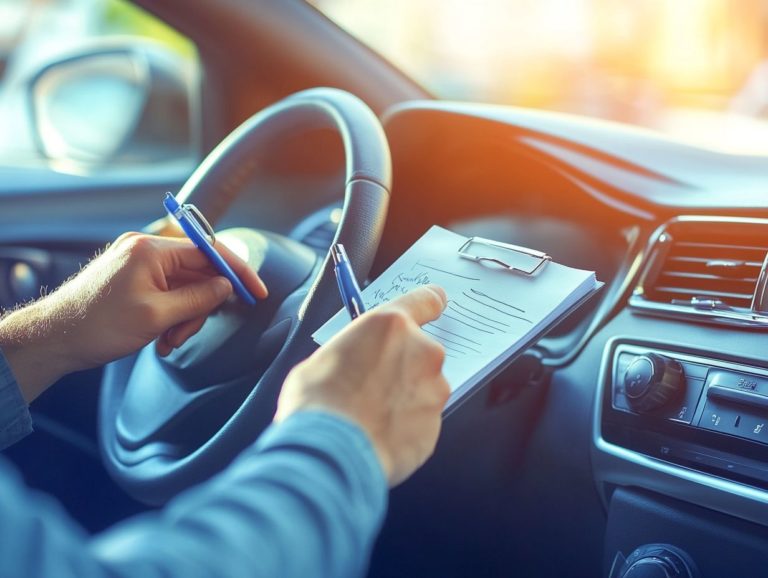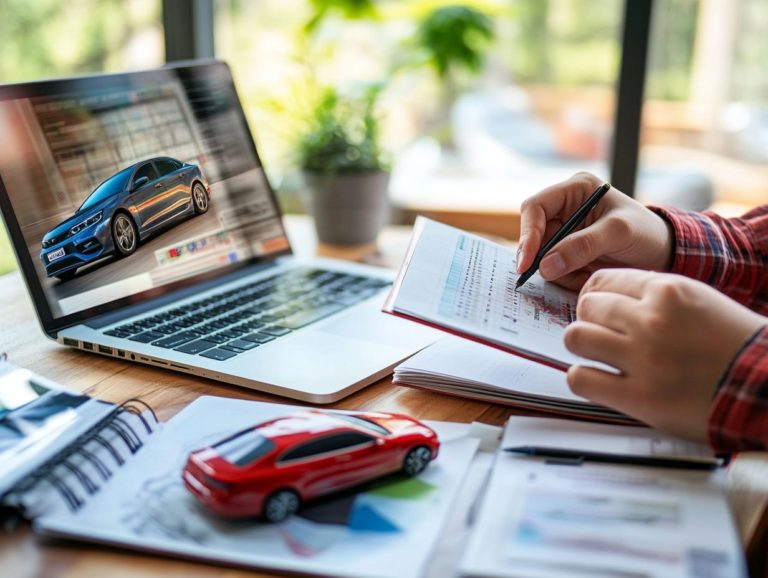5 Tips for First-Time New Car Buyers
Buying a new car is an exhilarating journey, but it can also feel a bit daunting, particularly for those stepping into this world for the first time. With countless options and factors to weigh, it s easy to find yourself adrift. This guide will illuminate the essential steps that will empower you to navigate your purchase from establishing your budget and researching various models to enjoying test drives and exploring financing options.
We ll also cover common pitfalls to avoid, weigh the pros and cons of new versus used vehicles, and outline the key documents you ll need. Let s get started on this exciting journey!
Contents
- Key Takeaways:
- 1. Determine Your Budget
- 2. Research Different Car Models and Features
- 3. Take a Test Drive
- 4. Consider Financing Options
- 5. Negotiate for the Best Price
- What Are the Most Important Factors to Consider When Buying a New Car?
- Frequently Asked Questions
- What are the top 5 tips for first-time new car buyers?
- How can I determine my budget for a new car?
- Why is it important to research and compare different car models?
- Why is a test drive important before purchasing a new car?
- What are some long-term costs to consider when buying a new car?
- Is it possible to negotiate for a better price when buying a new car?
Key Takeaways:

- Set a budget and stick to it to avoid overspending on a new car purchase.
- Research different car models and features to find the perfect fit for your needs and budget.
- Take a test drive to get a feel for the car and ensure it meets your expectations.
1. Determine Your Budget
Determining your budget is the first and most crucial step in the car-buying journey. It sets the foundation for your financial strategy and gives you the power to make informed decisions as you look at options such as car loans, interest rates, and various dealership fees tied to both new and used vehicles. For more insights, check out our guide on buying new cars: tips for budgeting.
To truly grasp your financial health in this context, assessing your credit score is essential, as it can significantly impact your loan terms and interest rates.
Evaluating your current personal finance obligations such as monthly bills and debt payments will give you clarity on what you can realistically afford.
When crafting your budget, it s important to consider not just the monthly car payments but also dealership fees like documentation costs and taxes. Also, remember to consider ongoing expenses like insurance, fuel, maintenance, and registration fees.
By analyzing these factors collectively, you can develop a clear view of your budget that fits your finances.
2. Research Different Car Models and Features
Researching different car models and their features is crucial for making an informed decision. You ll want to ensure that the vehicle you select perfectly aligns with your needs, preferences, and budget whether that’s a dependable Toyota Camry or a sporty Honda Civic.
Diving into the specifications of both used and new cars allows you to uncover essential details like safety ratings, fuel efficiency, and technology offerings, all of which can greatly influence your overall ownership experience.
Utilizing resources like Kelley Blue Book and Edmunds.com is a smart move. These platforms provide reliable pricing tools and user reviews, giving you valuable insight into a model’s long-term performance and retention of value.
Exploring options such as Carvana and CarMax can lead you to a hassle-free buying journey, offering the transparency and convenience that traditional dealerships often overlook.
3. Take a Test Drive
Taking a test drive is an essential step in your car-buying journey. It gives you the opportunity to experience firsthand the car s features, comfort, handling, and overall suitability before you make that final purchase decision.
Engaging with multiple vehicles during this process allows you to make direct comparisons of specifications and see how each car aligns with your lifestyle.
As you navigate different terrains, keep a close watch on aspects such as acceleration, braking responsiveness, and how easily you can park.
Don t overlook the visibility and comfort of the seating, as well as the technological features that can elevate your driving experience. By carefully assessing these factors, you can make a more informed decision that resonates with your personal preferences and needs.
Don t miss out on the perfect car for you start your research now!
4. Consider Financing Options

Considering various financing options is essential for making your car purchase more manageable. This exploration can help you find car loans, preapproved loans, and interest rates that suit your financial situation.
By exploring different types of car financing, you can find valuable options. This includes loans from banks like PNC Bank or attractive rates from dealership financing.
Obtaining a preapproved loan streamlines your buying process. It also gives you a clearer view of your budget, helping you avoid surprises.
Understanding the terms of an auto loan like interest rates and repayment periods is crucial. Taking the time to shop around can lead you to the most competitive rates, ultimately saving you money in the long run.
5. Negotiate for the Best Price
Negotiating the best price at a dealership is an essential skill that can dramatically influence your overall car expenses. This savvy approach allows you to maximize your trade-in value and secure the most advantageous pricing for your desired vehicle.
To navigate this process effectively, start by conducting thorough research on market prices for similar vehicles while understanding the true worth of your trade-in. Gathering multiple valuation estimates from reputable online tools empowers you with a stronger negotiating position.
Be aware of dealership fees, like documentation and preparation charges, to avoid unexpected costs that could disrupt your budget. Maintain a willingness to walk away if the terms don t meet your expectations. This assertive stance can sometimes encourage the dealer to present a more enticing offer to retain your business.
What Are the Most Important Factors to Consider When Buying a New Car?
When you’re in the market for a new car, consider key factors to make a smart purchase. Think about your financial strategy, the features you want, and how insurance costs fit into your budget. Additionally, if you’re considering leasing, check out these essential tips for first-time car leasees to ensure a smooth experience.
First and foremost, the reliability of the vehicle plays a crucial role in both your peace of mind and your long-term expenses. Opting for a dependable model can significantly reduce maintenance costs and boost resale value.
Safety ratings should also be at the forefront of your considerations, as they provide vital insights into how well a car protects its occupants. It’s also wise to explore various financing options; many dealerships have special deals that could ease your monthly payments. Additionally, understanding how to prepare for a new car purchase can help you make informed decisions.
Calculating insurance costs ahead of time will help you avoid any unexpected expenses, ensuring a smooth financial transition into your new vehicle.
What Are the Common Mistakes First-Time Car Buyers Make?
As a first-time car buyer, you might find yourself falling into common traps that can dampen your overall satisfaction and financial well-being. To avoid this, consider following some tips for first-time new car buyers. Failing to conduct adequate research on vehicles, overlooking the total costs involved, and neglecting to assess your personal financial situation before making a purchase can lead to regret.
Many buyers overlook long-term car expenses like insurance, maintenance, and fuel, which can significantly impact your budget. To avoid surprises, consider how to prepare for new car ownership—remember, the initial price tag is just the beginning.
Ignoring financing options is another crucial misstep; not exploring various loan programs could result in overpaying or locking yourself into less favorable terms.
To sidestep these pitfalls, take the time to conduct comprehensive research on both the vehicles you’re considering and the financing options available. For first-time buyers, checking the top 5 used cars can be particularly helpful. This informed approach not only enriches your buying experience but also lays the groundwork for financial stability in the years following your purchase.
What Are the Benefits of Buying a New Car vs a Used Car?

When you’re faced with the decision of choosing between a new car and a used car, you must consider the benefits of each option. New cars often impress with the latest features and warranties, while used cars can offer substantial savings and reliable choices.
New vehicles typically boast new tech features, improved fuel efficiency, and a fresh, appealing aesthetic that many buyers find irresistible. However, this pristine condition comes at a price: you might see the car’s value depreciate by nearly 20% in the first year alone.
Opting for a used vehicle allows you to sidestep that initial drop in value. Plus, you often enjoy lower insurance rates. Take, for example, a certified pre-owned Honda Accord, which is a used car that has been inspected and certified by the manufacturer, striking a perfect balance between affordability and quality.
In contrast, while a brand-new Tesla dazzles with its cutting-edge tech, it may lead to higher maintenance costs down the line. Ultimately, by weighing these factors thoughtfully, you can make a decision that aligns perfectly with your budget and needs.
What Are the Additional Costs to Consider When Buying a New Car?
When you re in the market for a new car, you must consider the additional costs that often come with the initial purchase price. Think about insurance costs, dealership fees, and ongoing expenses that can affect your overall budget.
Several hidden costs are worth keeping in mind. For example, registration fees can differ by state and may catch you off guard. Maintenance is another major expense; routine services like oil changes and tire rotations, along with surprise repairs, can add up faster than you might expect.
Don t forget about fuel costs, which can be quite significant, especially if your new ride isn’t known for stellar mileage. To manage these extra costs, consider creating a detailed expense tracker.
Set aside specific amounts each month for maintenance and fuel. It s also wise to look into vehicle insurance quotes ahead of time, giving you a clearer picture of this crucial aspect of car ownership and helping you devise a more accurate financial strategy.
How Can One Get the Best Deal on a New Car?
Securing the best deal on a new car requires a blend of savvy dealership negotiation, comprehensive research on financing options, and a keen awareness of current market conditions to maximize your savings.
Timing your purchase can dramatically affect the deal you achieve. Opting to buy at the end of the month or during holiday sales events often leads to significant savings.
Delving into competitive financing offers from banks and credit unions gives you greater leverage in negotiations. Equip yourself with knowledge about current manufacturer incentives and seasonal sales that could influence pricing.
By investing time in comparing offers and understanding the dealership s perspective, you ll bolster your bargaining power, setting the stage for a more favorable agreement.
What Are the Essential Documents and Paperwork Needed for a New Car Purchase?
Preparing for your new car purchase involves gathering essential documents and paperwork to ensure a seamless transaction and adherence to legal requirements. This includes essential resources for new car buyers.
- Proof of insurance
- Identification
- Financing documentation
- Vehicle registration
- Proof of residence
- Trade-in paperwork
Each document is vital for verifying identity and ownership, ensuring compliance with local regulations. Having proof of insurance not only protects you but also safeguards the dealership from any unforeseen liabilities.
To make your buying experience as smooth as possible, create a checklist and organize your documents in a readily accessible folder for dealership visits. Referencing an essential checklist for new car buyers can also help ensure you don’t miss any important steps. Get ready to drive your new car off the lot!
Frequently Asked Questions

What are the top 5 tips for first-time new car buyers?
The top tips for first-time new car buyers are:
- Set your budget and stick to it.
- Research different car models.
- Take a test drive before deciding.
- Consider long-term costs like insurance and maintenance.
- Negotiate for a better price! Don t miss your chance to negotiate for a better price! Be confident and prepared!
How can I determine my budget for a new car?
Consider your monthly income and other bills. Aim to keep your car expenses under 20% of your monthly income.
Why is it important to research and compare different car models?
Research different car models to find the best fit for your needs and budget. This helps you understand features and pricing, leading to a more informed decision.
Why is a test drive important before purchasing a new car?
A test drive is crucial as it lets you experience the car and its features, check for potential issues, and ensure it’s comfortable for your driving needs.
What are some long-term costs to consider when buying a new car?
Some long-term costs to consider include:
- Insurance premiums.
- Maintenance and repair costs.
- Fuel efficiency.
Factor in these costs to ensure the car fits within your budget in the long run.
Is it possible to negotiate for a better price when buying a new car?
Yes, it is possible to negotiate for a better price. Do your research and be prepared to negotiate with the salesperson. If the price isn t right, don t hesitate to walk away.






